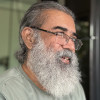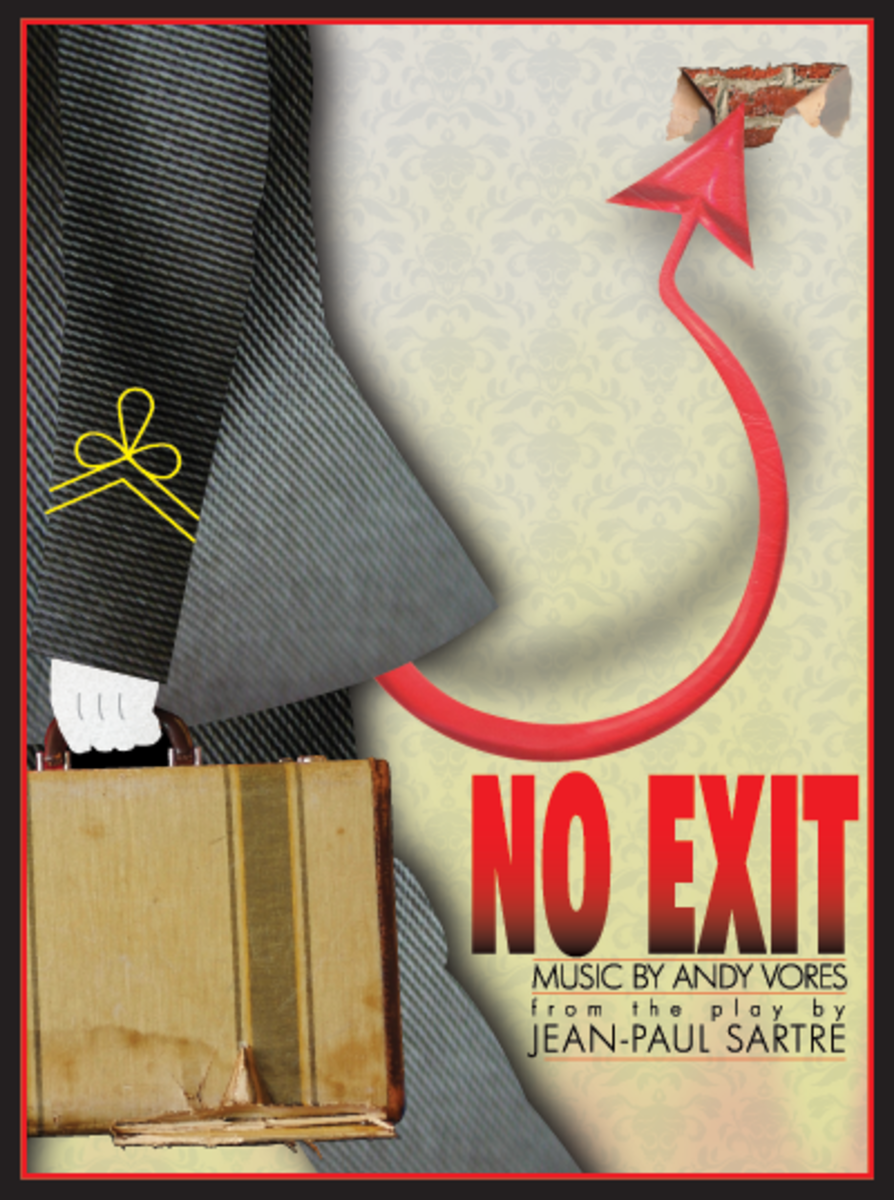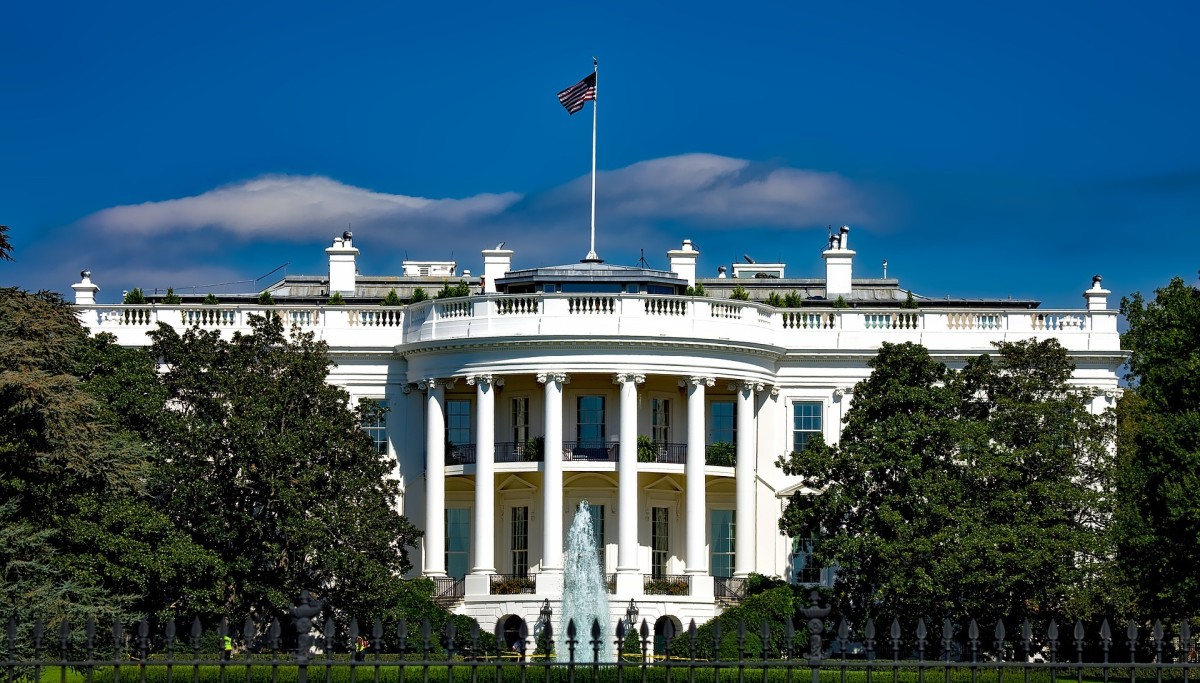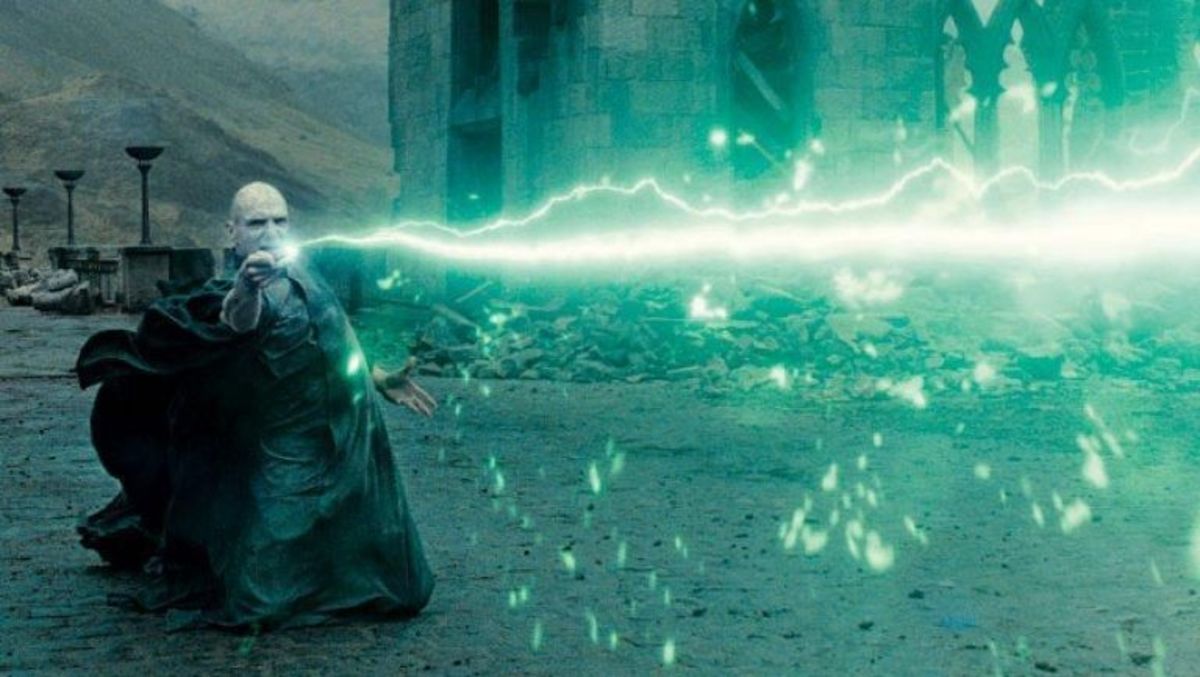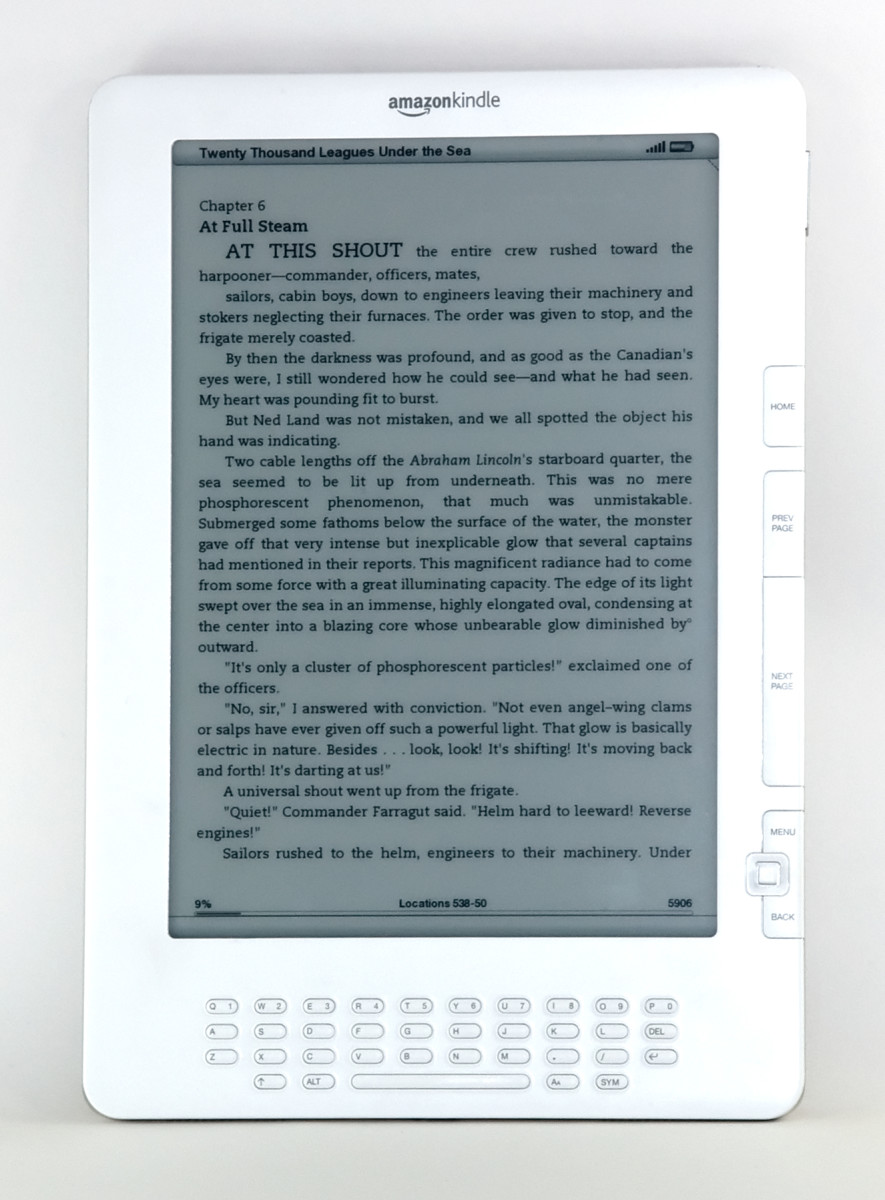Of Pebbles, Politics, Mind, and Matter: Chapter 10
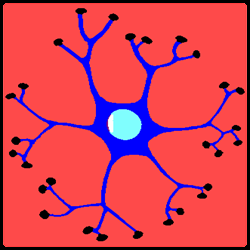
In this chapter:
His unsolicited fame makes Governor Charuchandra Chimalgi the target of terrorists. In a sequence of fast-paced events, he finds himself a hostage in the hands of a feared man who demands the release of his comrades serving jail terms in return for sparing the governor's life. Read on to know how the matter is resolved and Charu reaches the ultimate state of un-being. The story concludes with this chapter.
If you wish to revisit the first chapter at this point, please click on the following link:
If you wish to revisit the second chapter at this point, please click on the following link:
If you wish to revisit the third chapter at this point, please click on the following link:
If you wish to revisit the fourth chapter at this point, please click on the following link:
If you wish to revisit the fifth chapter at this point, please click on the following link:
If you wish to revisit the sixth chapter at this point, please click on the following link:
If you wish to revisit the seventh chapter at this point, please click on the following link:
If you wish to revisit the eighth chapter at this point, please click on the following link:
If you wish to revisit the ninth chapter at this point, please click on the following link:
If not, please scroll down to read the tenth chapter titled "To the Brink and Beyond".
..
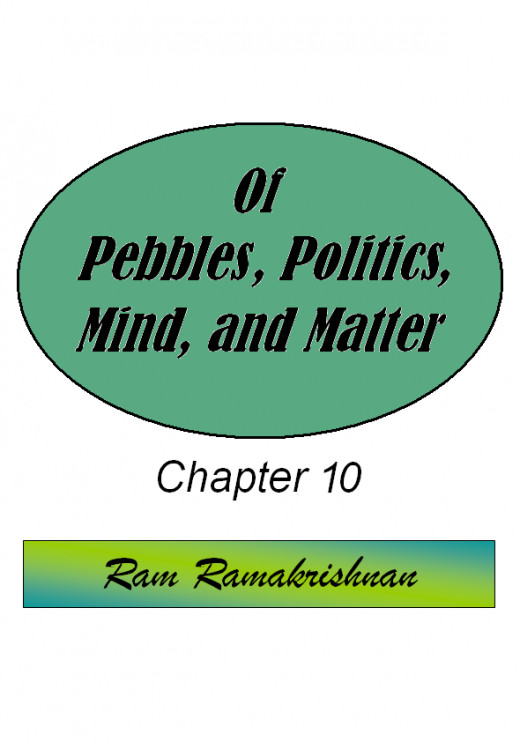
Chapter 10: To the Brink and Beyond
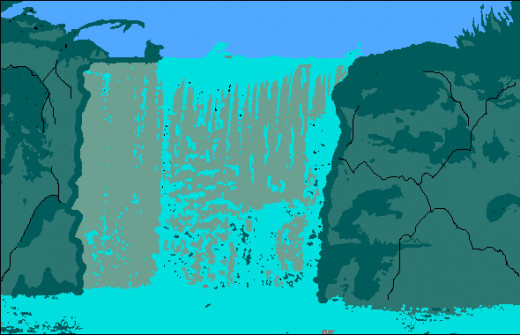
Charuchandra had insisted on continuing to live in his ancestral house after being appointed governor but there were objections to this from security agencies. He was convinced by them to move to the official gubernatorial residence.
The governor remained listless for a few days after the shift. He missed his pond and pebbles and his sense of rectitude and decency stopped him from requesting the authorities for one to be recreated at his official residence, which had sufficient open land abutting it for the purpose. It was Snigdha's tactful intervention that settled matters amicably. She dropped meaningful hints when the right persons were around and the message got understood and transmitted. Not long afterwards, the governor's official residence had a new, aesthetic improvement made to its already arty ambiance. A scenically enclosed pond with a waterfall, was added to it, accessible only from the governor's private chambers. Charuchandra was more than his normal self again, an evening of stone pelting at the pond side with Snigdha for company having transformed him into an active, lively, and vigorous being.
Android Ranga, during the course of his conducted tour around the house, had spent a while looking up the pond enclosure from all sides. Security being his primary concern, he had assessed the vulnerability of the place to outside access. He was not very satisfied with its proximity to the private chambers of the governor, but had kept his counsel.
With the familiarization exercise coming to a close, Li Bong Park was to leave for Korea on the evening of the seventh day of his schedule. The governor had insisted that he stay on for a day more as his guest, having arranged to have the Korean visit a few places of historical interest nearby. The governor had also offered his guest the services of Ranga for the day, if he so desired, but Li Bong Park had graciously declined.
An official vehicle departed from the governor's residence for the sightseeing tour with the Korean and a security officer deputed to guard him.
Ranga joined the governor's family at the breakfast table. A plate was laid for him as well and a sampling of all dishes was served. The android had requested for this, as he wanted to get to know their eating habits, the color, shape, and texture of the food they ate, and also the recipes.
" You don't eat and you can't cook. What would you do with the recipes, Ranga?" asked Snigdha.
"I certainly can't eat. But what makes you say that I can't cook?" retorted Ranga.
"Look, Ranga. It is indeed overwhelming to witness the range of your capabilities. But saying that you can also cook is stretching it a bit too much. Practice of the culinary arts requires years of training, a keen sense of smell, a certain amount of intuition, and the dexterity of feminine hands. I think you should confine your activities to realm of practicality and not extend yourself unnecessarily."
Charuchandra looked at Ranga anxiously, wondering whether the android would be offended by his wife's comments. Even if he was, Ranga conveyed no sign of it. He merely said, "It is part of my regimen as a security android to do this."
The remainder of breakfast time was a quiet contemplative affair. The three young men left for the university to attend classes and Snigdha went to attend to the affairs of the house. The governor consulted his schedule sheet for the day placed on the table by his aides-de-camp. The first meeting was listed half an hour later. Along with the schedule was another note with the latest brief on the terrorists. It said that there was authentic information about them having infiltrated into the city. Security had been tightened at all important places, including the governor's residence and preventive arrests had been affected of known habitual offenders with suspected links to such organizations.
"Come, Ranga. Let us have a relaxed time by the pool-side until I go to work," said Charuchandra, getting up from his seat.
"You love that place, don't you, Charu?" asked Ranga.
"Yes, I grew up alongside one, from the time I was in a cradle. Not this one though. We have a pond attached to my ancestral home in this city. I will take you there some day for a visit."
"I will be happy to go and see it. But tell me, Charu, what is it that you experience when you keep flinging stones into the water? I have been watching you do it, whenever you are here. Do you do that for any specific purpose?"
"I can think well when I do that. Perhaps, some form of constant background physical activity maintains the electrical potentials in the neural networks of the brain close to their threshold levels, making the activity of information retrieval and processing happen at its optimal capacity. Also with time, the brain appears to have established a permanent link between deep thought and this particular physical activity, to the extent that if I don't fling stones into the water, I can't think."
"A reasonable surmise," agreed Ranga, and added, "Let me a pelt a few to see how I feel."
Having never had an experience of this activity before, android Ranga's first throw sent the pebble careering out of the enclosure, over the large plot of land that housed the governor's residence and out into the street beyond.
"Not so hard, Ranga!" exclaimed the governor, laughing. "If I were to indulge in such strenuous activity, I wouldn't be able to think at all."
A few more trials made Ranga adjust the force and angle of release for a gentle throw that made the pebble skim the surface of the water body a few times before dropping down to its bottom.
"That was perfect. You learn fast," commended the governor.
* * *
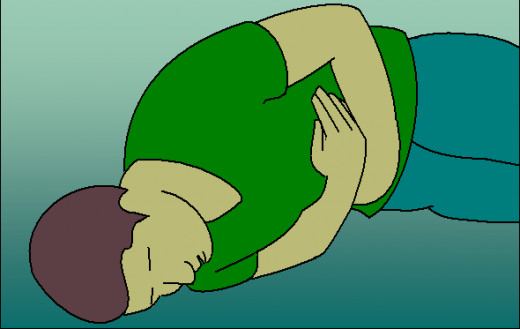
Li Bong Park had a good time looking around the nearly nine-hundred-year-old structures. Unknown to him as well as the security officer accompanying him, he had been tailed from the time he left the governor's place in the morning. Those following him, kept a discreet distance until on the way back, the Korean stopped at an eatery for a cup of hot coffee. One of the men who were stalking him followed their quarry into the eatery and occupied a seat a few tables away. Li finished his coffee, paid for it, and on the way out, walked into the men's. The stalker saw his chance and while the security officer waited outside, followed the Korean into the exclusive zone.
Of the two who entered, only one stepped out, holding his stomach and obviously in pain. It was the Korean, Li; at least that is what the security officer thought, because the man was wearing the same clothes, similar sunglasses, and the same pair of shoes.
"What is wrong, Mr. Park?" the security officer asked, rushing to his side.
"Take me back quickly. I need to urgently have a medicine that is in my luggage," replied Li, his face contorted with pain and his voice, hoarse.
The security man, quickly led the Korean to the vehicle, made him lie down in the rear seat, and sped away, the red beacon on the roof of the vehicle swirling and its siren wailing.
There was great commotion at the governor's residence, when the wailing vehicle reached there. Charuchandra broke protocol and came out to the patio to see what the matter was, Snigdha by his side. Avyay, Jado, and Lalnithanga had returned from the university and rushed out too. Android Ranga ambled out behind them, his hand clutching a weapon.
The anxious security officer asked some of the governor's staff for a stretcher to be brought and narrated what had happened. Li Bong Park was lying face down on the rear seat and moaning.
The stretcher was brought, the ailing man transferred on to it, and carried away to the guest room. Charuchandra made to follow and found Ranga restraining him with an arm on his shoulder.
"Let no member of your family - including you - go to him yet, until I have checked him out," said Ranga.
"What do you mean, Ranga? The man is obviously suffering, and has asked for some medicine, which he carries with his other belongings, to be given to him. He is in no state to help himself," protested Charuchandra.
"I will do that. Let no human go near him, until I have checked him out," said the android.
"Do you suspect that he has a dangerous and contagious disease?"
"No, it is something else. I suspect that he is not Li Bong Park."
"What do you mean, Ranga?" exploded the governor. "Here is a suffering man in need of help and you suspect his identity! The security officer was with him from the time he left this place. He didn't mention that anything was amiss. Or is it that you suspect that officer's identity also?"
"The security officer is clean. The man who has been carried inside is not," maintained Ranga.
"Look, Ranga," said the governor, annoyed. "I am going to him. You can come with me if you wish, but you will not stop me and that is an order."
"As you say, Charu," said the android without showing any emotion and walked behind the governor, who led the way to the guest room.
The spectacle of two resident staff members rummaging through the belongings of Li Bong Park for the drug that he mentioned was there and the Korean writhing in apparent pain, greeted Charuchandra and Ranga as they entered.
The governor walked up to the man lying prone on the bed with one hand held to his stomach and took his other hand into his own.
"I have asked for a physician to come immediately, Li. He will be here any time now," said the governor, in a concernedly reassuring voice.
And at that moment, the ailing man transformed into an aggressive activist. He whipped out a gun from under his belt, which he had been holding all this while in the guise of keeping his stomach pressed, positioned himself between the wall and the governor, pointing the gun at his hostage's back, and yelled, "Keep away, everyone! One wrong move and your governor is dead!"
The fake Li Bong Park then spoke to someone on his mobile phone. "Send the word out. I have the target in my custody," he said.
Charuchandra glanced at the wall clock. It was 6 pm.
* * *
Within ten minutes of the incident's happening, all television and radio channels around the country carried the report that the governor had been taken hostage by a terrorist and was held inside his official residence. The real Li Bong Park was found badly injured, drugged, naked, and unconscious in the toilet of an eatery in the city's outskirts and the security officer who accompanied the Korean during his morning sojourn was called in to identify him, based on the report of the eatery owner who had noticed the duo and also noticed that it was one of the governor's official vehicles in which the foreigner had come.
Further details soon began to pour in. It was revealed that the terrorist, who held the governor, was from the northeastern region of the country and bore a facial resemblance to the governor's guest. He had apparently switched places with the Korean, put on his clothes, faked illness, and hoodwinked the security officer into helping him easily breach the heightened security cordon around the gubernatorial house.
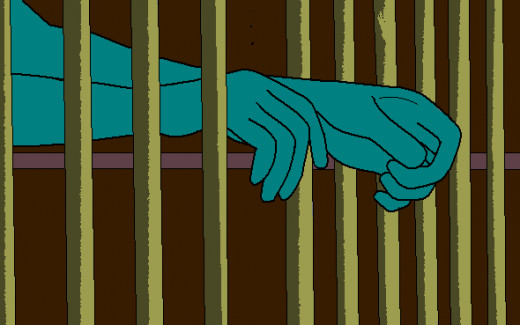
As the stunned nation watched and waited, the demands for the governor's release were spelt out. The release of five men serving long jail-terms for similar attempts earlier was the primary demand. Others included the government to declare specified concessions to certain sections of the population, and safe passage to the hostage-taker, his accomplices at large, and the released prisoners to an unspecified destination.
While the government mulled over its likely response, events unfolded at the scene of crime in a manner that would decisively influence it.
To pressurize the government into taking a quick and favorable decision, the hostage-taker started to restrict the food intake of the governor, and this move of his was publicized through his accomplices to the media. Public resentment against the abductors and sympathy for the already highly esteemed governor, started to steeply rise. Also on the increase was the concern of the governor's family members, as well as the government about the affect of this upon Charuchandra's health. Given to a sedate lifestyle - where throwing pebbles into a pond constituted the most strenuous exercise - the governor's physical condition could not be termed robust. Peering at the wrong side of the fifties, his age too wouldn't have been very supportive of any drastic change in his daily routine.
The governor however, seemed unperturbed. About an hour past midnight, when his ordeal was into its eighth hour, he could finally succeed in striking a conversation with his abductor, after many aborted attempts. Perhaps, it was mutual admiration that made them talk to each other freely, though the younger man had been reluctant initially. Charuchandra marveled at the man's commitment to his cause and his self-discipline. The abductor admired the governor's composure and his calm demeanor in the face of such adversity. Their talk meandered across a host of subjects from their personal lives, to their world-views and their perspectives of life beyond.
"Your manner of speech and your command over language indicates that you are well read, young man. Which university did you go to?" asked Charuchandra.
The man gave the name.
"That is a renowned place of learning. You should have had an excellent academic record to have got into it," remarked the governor.
"Yes, sir."
"Then why did you take to this path?"
"I pursued education for its own sake and believe that, that is how it should be. Those in power, use education as a means of exploitation - of nature and of all fellow beings. They make a mockery of it and I couldn't stand it."
"Do you think you or a handful people like you, can change the course of the world?"
"Sir, we have a complete dossier on you, and are aware of your rather open and liberal views, which is at variance with that of the party of which you are a senior and revered member. I could even go to the extent of saying that many of our views - yours and mine - seem quite similar, if not identical. Do you think your views have made a difference to the way your partymen think or behave?"
"I can ask you the same question, young man. Among the men whose release you have sought, are a few who have had a history of truly condemnable acts - condemnable even by the standards that you espouse. Do you think that their association with you is going to make any difference to their behavior and outlook?"
"Any movement needs its foot soldiers, sir, and there are certain incidents in every movement's history that are best overlooked in the context of its larger and praiseworthy goals."
"Agreed, young man. My party members who do not subscribe to my views are my foot soldiers, and their indulgences too are to be overlooked in a larger context. We appear to have similar views and goals, by your own assessment. Then where is the conflict? Why do we have to consider each other enemies?"
"Ha! I suppose you are not getting round to convince me to surrender, or are you? I have gone too far for that now. If I have to kill you to achieve my objective, I shall not hesitate, though I will regret having to do so. Please understand that."
"I expect nothing from you, young man. Know this too, that though I do appreciate your stand, your dedication, and your broad objectives, should it so happen that I have to sit in judgment over your deed, I too will not hesitate awarding you a punishment commensurate with your crime as seen from the point of view of the existing laws."
"Your laws have no meaning, sir. They are made by the elite of the society for their own convenience and to aid unbridled exploitation. I do not recognize them."
"Any society will require a set of laws to abide by, to be called one, and these laws are dictated by prevailing conditions and the intent and purpose of that society."
"These are all man-made laws. There is a natural and universal law that I believe in."
"There indeed is, and the man-made laws are subsets or extensions of that universal theme."
"That is your perspective, sir, and it need not be correct."
"Young man, tell me what do you understand by the word, law?" asked Charuchandra.
The abductor looked at his watch. There was still half an hour to go before the scheduled arrival of his colleagues who were to be released from prison and brought here before being flown out in a helicopter from the rooftop of the governor's residence to their hideout. There was time enough to continue the debate.
"I would say it is an imperative of behavior, which is enforceable by someone in authority."
"Absolutely precise," lauded Charuchandra. "For this particular operation, you are the one in authority, I suppose?"
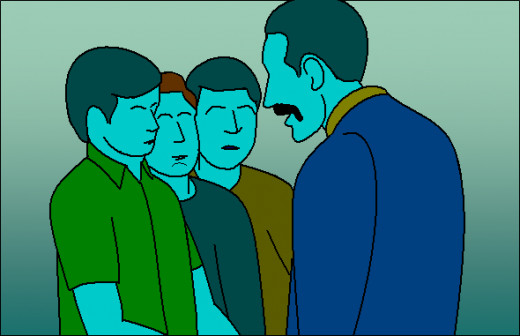
"Yes, that is right."
"You lay the ground rules and your accomplices are expected to follow whatever you say without question, is it not?"
"Yes."
"Who gives you the authority to specify the rules and enforce it?"
"I derive it from the universal law through someone in authority above me."
"What makes you accept this hierarchy to be valid and condemn other such hierarchies to be evil and wicked? They too could be deriving their authority from the same universal law. I would go a step further and insist that they do so indeed."
"I only go by what the authority above me says. If he says others are evil and wicked, then so they are."
"Have you been a follower of this higher authority that you mention, right from the beginning?"
"No, I got to know him only a few years ago."
"Was there was someone else earlier?"
"Yes, there was. But he turned out to be like a person from your society," said the young man with venom in his voice, and then added, "though you are different from the others."
"Had you met me earlier, would you have considered me an authority worth listening to?"
"Perhaps, but this is a wasteful exchange of words. What is past cannot be undone."
"The point that I was trying to make was not whether or not you would have followed me. The point is that you followed and accepted as an authority only someone that you were comfortable with, whom you felt thought the way you did, and whom you believed would help you reach your cherished goal. You were, and are, the authority, not the other person. Saying that you follow someone else is a very convenient way of shirking responsibility. It is also an expedient manner of denying another person the right to think in a way that is appealing to them."
"If that is so, then why do you - I mean your society - attempt to change our way of thought and our way of life?"
"If your way of life includes, causing us harm, suffering, and death, then obviously we will. Do you expect us to sacrifice ourselves to someone else's whims?"
"Isn't that what the rich and powerful do? It is we who are retaliating for a wrong that has been done by you and not the other way round."
"I think we have come full circle in our debate, my young friend, with no definite conclusion. It is so with life too. It is always this dilemma of whether it was the chicken or the egg that came first. You spend a whole lifetime seeking answers to certain questions and at the end, find that you are where you began."
The staccato roar of a helicopter's engine told them that the means of getaway had arrived and it was time for action again.
* * *
The security authorities were in a bind, being confronted with a situation where they had every wherewithal in place to conduct a lighting strike into the guest room of the governor's residence to neutralize the terrorist. The only hitch that held them back was the almost certain loss of the governor's life given the background of the abductor who held him. This wasn't the first time that he was involved in such an activity and had gained a fair degree of notoriety as a daredevil who wouldn't flinch at anything. The government was almost resigned to letting the terrorists escape, taking the governor with them as hostage, and was hoping that they would free Charuchandra Chimalgi, once they felt that the threat to their safety was past.
Android Ranga and the governor's three sons - real and foster - however, had other plans.
The rapid strides made by the android in all aspects of familiarization and his unprecedented and unexpected proficiency had been kept a secret, with only Li Bong Park, the governor and his immediate family being aware of it. The plan put together by Avyay, Jado, and Lalnithanga, presumed this; its success depended on this presumption being true. They had asked Ranga whether he would be willing to risk his existence. The android's reply would have made the real Ranga proud, had he been alive.
"I would rather perish trying to save Charuchandra than be around regretting that I did not do so when there was an opportunity. Though an android, I believe - and this is my reasoned assessment - that between the lives of Charuchandra and the man who has abducted him, the former being alive would be beneficial to more individuals than the latter. I am ready to participate in whatever scheme that you may have come up with, provided I too find it practical," said he.
The counter-conspirators went into a huddle. When they came out of it, their grim and determined faces indicated that they had a plan in place and were resolved to see it through. The aides-de-camp was requested to provide them with particulars of all prisoners who were to be released, including their photographs and was also asked to ensure that they were in their prison uniforms when they were freed and conducted to the governor's residence. It was made available to them about an hour before the time scheduled for the abductors' planned escape in a helicopter. No one saw them after that and none was bothered either. The solemnity of the situation was weighing everyone down into thoughtless silence and inactivity.
The sound of the helicopter landing on the rooftop brought everyone out of their stupor. The pilot had been ordered to keep the rotor spinning and be ready for take-off at a moment's notice, which made the noise of the arrival of the prisoners go almost unnoticed.
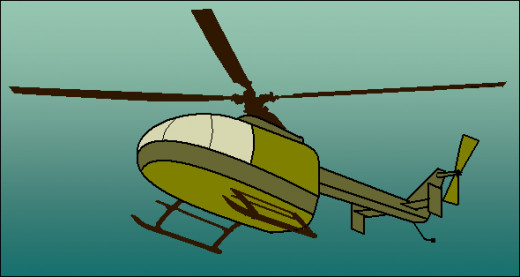
The man holding the governor was constantly being updated about the movements of the released prisoners by his informers stationed at strategic locations along the route. He had demanded that they be armed as soon as they reached the governor's residence and the path that led to the rooftop from the guest-room where he held the governor be made free of all security personnel, warning the authorities that he would pump bullets into the hostage's head at the slightest suspicion of his orders not being complied with.
The five released prisoners trooped in as expected into the guest-room, armed with loaded weapons and a mixture of anxiety and anticipation on their faces. Long months in captivity had made their bodies emaciated, but the excitement of probable freedom had infused a new vigor into them.
The hostage-taker asked them a few very personal questions about their lives to ascertain that they were really the persons they were supposed to be. Having satisfied himself, he assigned them their respective roles to play in the next few crucial minutes.
The hostage-taker was to use the governor as a shield and make him lead the way to the roof. Two of his five accomplices were to cover his rear. The other three were to station themselves at corners along the path to ensure smooth passage for the group and join it as they went past them.
Android Ranga was already on the rooftop, dressed as the released prisoners were, and armed with an automatic rifle and a gun with a silencer. He started to climb down the stairway, crouching below the level of the armrest, about the time that the party of fugitives with their hostage, began their break for freedom on the path leading to the rooftop. Ranga stopped short of a turn past a landing in the stairway and waited.
The fugitive detailed to cover the last turn on the landing, a few steps short of the door to the rooftop, rushed up the stairway, and abruptly faced Ranga as he took the bend. The Android was ready, and a well-aimed shot got the fugitive in the head. There was a muffled cry as the man hit the floor, dead.
Ranga quickly pulled the body up, so that it could not be seen from the lower end of the stairway. Avyay and Jado, who were waiting by the door on the rooftop, quickly came down the few steps and dragged the body away.
Android Ranga had smeared some of the blood oozing out of the dead man's wound upon his face and clothes as a camouflage and just as he finished doing so, the fugitive manning the next vantage point below came up to find out what the disturbance was. The dying man's cry had faintly reached his ears and he had called a halt to the procession below and come up to investigate.
"What happened?" he asked seeing the blood smeared face and clothes of his friend.
"Slipped and fell on my face. Suppose I have a broken nose and jaw and perhaps a broken rib too. But can manage. Let the others come. But you will have to take my place here at the top. I will not be able to handle a weapon properly," said Ranga in a slurred voice.
The other man called downstairs for the advance to continue and bounded up towards his supposed accomplice, only to meet the same fate as the earlier man. Ranga hoisted the body of the dead man on his shoulders and stood on the staircase with his back to the next man who would come up.
And come up he did, wondering why one of his accomplices was carrying another.
"What is wrong with him?" asked the third man.
"Appears to have broken a few bones and cannot move on his own," said Ranga amidst making sounds akin to breathing heavily. "Why don't you go up ahead to cover for us, while I carry this guy up?"
The third fugitive took the steps two at a time and eased ahead of the two men. That was the last step that the man took, for the moment his back faced the man behind him, who carried another, a bullet fired from the silencer-fitted-gun at close range, entered the base of his neck and emerged out through the forehead.
"Three down and three to go," one of the android's parallel processors deduced, based on the stimuli that its optical, acoustic, and tactile sensors transmitted.
The main party of fugitives with the governor leading it at gunpoint reached the landing below and looked up. They too saw the same spectacle that the last man who went up had seen - one of their accomplices with blood smeared clothes standing at the landing above, facing away and another slung over his shoulder.
"Come quickly!" the standing man gasped. "This one seems to have had a bad fall and is completely immobile."
"Where are the others," their leader shouted.
"At the door above the next flight of stairs," shouted back Ranga. The constant drone of the helicopter's engine was making verbal communication difficult.
As the party of four men reached halfway up to the landing where Ranga stood, the android turned round and in one quick and fluid motion, threw the bulk of the man he was carrying at the advancing party.
The dead man's body hit the governor and sent him and those closely behind, tumbling down the stairs. Before they hit the landing, android Ranga had his weapons at the ready, one in each hand. He shot one of the fugitives who brought up the rear as he hit the floor and the other as the man attempted to scramble up.
The gun that the leader of the group held to the governor's back had slipped out of his hand and lay on the first step above the landing. The man himself lay under the governor, grunting with pain. Yet he had the presence of mind to look for his weapon and having spotted it from the corner of an eye, attempted to reach it. Charuchandra felt the man straining under him, realized what he was trying to do, quickly grabbed the weapon himself, and pointed it at the man's head.
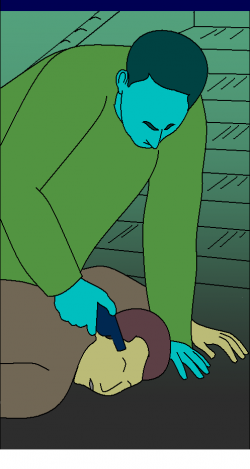
"You wouldn't kill me, Governor. You can't. You aren't that kind of a man. The values that you hold dear will not let you do so. Give me the weapon and let me go. I promise that I will leave you here unharmed," said the leader of the fugitives, in his last desperate attempt to escape. He still believed that the man coming down the stairs in a prisoner's uniform was one of his own and that this had been only an accident.
But when he heard the other man say in an unfamiliar voice, "Charu, I will deal with him," he knew that his cause was lost.
"Kill me then!" the man yelled.
"Yes, Charu. Let me finish the job before the members of your staff and the security personnel come here. I can hear them already. I would like my identity to be a secret. It will be good for everyone, if it is so," said android Ranga coming closer.
"No, Ranga. This man will live. His hands are pinned under my weight and I can easily hold him back for a few seconds more until the security men arrive. You run along now, and thank you for everything that you did," said the governor.
Android Ranga peered down the stairway beyond the landing and could see many people congregated at its base, tentatively taking their first step upwards. Assured that Charuchandra will be safe, he bounded up to the roof, where Avyay, Jado, and Lalnithanga waited, and the four went back the way they had made it to the roof - through a sky-window in the storeroom.
When the people on the ground floor cautiously reached the landing, they weren't prepared for what they saw - the governor having overpowered the abductors single handedly. Among the party were two newsmen who were able to take pictures of Charuchandra in action, straddling his abductor with a gun held to the fallen man's head.
"How did it all happen, sir?" asked the chief security officer.
"There was an internecine fight between them. In the confusion of the melee, I found myself in this position and took advantage of it," said the governor. His description was so close to the truth that there was no need of an effort to make up a story.
As the governor was helped up to his feet, he said to the man he had helped being apprehended, "Perhaps, we would meet again under better circumstances, young man, and I can only hope that your views on life would have changed by then and become more inclusive."
The fugitive was led away.
Governor Charuchandra Chimalgi had become a superman overnight. The newspapers and television news channels carried the photograph of him sitting on the terrorist holding a gun to his head. "Apostle of peace and champion at combat," said the headlines. Congratulatory messages flooded the governor's office from across the world.
He also became the inevitable choice for the post of President of the nation with no political party opposing his candidature. The incumbent President still had a couple of months of his term to be completed, but Charuchandra began to be accorded a similar deference and honor even before he formally assumed office. He had the distinction of being elected the youngest president of the country, all his predecessors having been past the age of sixty-five when their respective presidencies were inaugurated.
The family, of which android Ranga had now become an inseparable member, moved to the country's capital city not long after. Needless to mention, the presidential palace soon had a beautiful large pond with many a waterfall, mounds of pebbles artistically arranged at reasonable distances along its bank, a picturesque garden around it, and an assortment of animals and birds that called this serene place their home, which included deer, rabbits, squirrels, parakeets, peacocks and birds of paradise.
About two years later, a lawyer hired by an anonymous person to represent the terrorist who had been jailed on charges of waging a war against the state and illegal confinement of government officials with an intent to kill, filed a mercy petition on behalf of the convict seeking pardon from the President for his crimes with a promise to lead a peaceful life. The petition went on its customary meandering journey through the corridors of officialdom, which lasted almost an year, before reaching the desk of the President for his assent.
In an unprecedented move, the President sought permission from the government to interview the petitioner before giving his assent, which was immediately granted. Nothing that Dr. Charuchandra Chimalgi asked for could be refused and he asked for very little.
The prisoner was brought to the palace for an audience with the President.
"So, we meet again, young man, but under very different circumstances. You would have had ample time to reflect upon our short discussion three years ago and its ramifications. A petition seeking my pardon for you, has come to me. Before granting it, I wanted your opinion on whether you would be willing to accept it," said the President.
"I will do so on one condition. I wish to know the identity of the person who hired the lawyer on my behalf to plead for mercy. If it is someone that I respect, then I will accept it. Otherwise, life in a prison cell will be more honorable," replied the convict, his held high.
"Will it suffice for you to know that in my opinion, it is indeed someone that you have regard for?"
"No, it will not."
"Then, at the risk of being ridiculed by the government and possibly by the people too, if they were to know this, let me tell you this, young man, that it was I who hired the lawyer."
"I suspected as much. But why did you do it?"
"Because I believe that you have the potential in you to bring about a positive change in the lives of many, if you were to adopt the right methods."
"And I, sir, will be happy to accept the grant of pardon coming from you. Rest assured that the fact that you initiated the entire process will not be divulged by me to anyone."
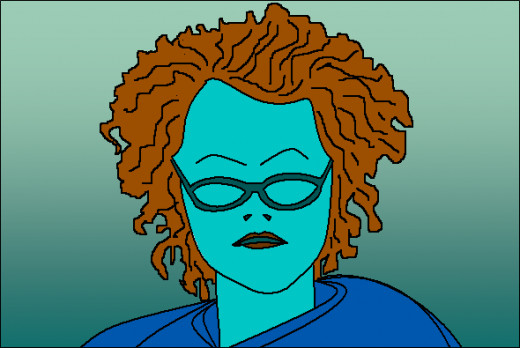
"It wouldn't matter to me now, even if you did, young man. Like you, I too do not like to be obliged to anyone for any reason, even if it were to result in my being impeached for treason."
There was a brief pause as the two conversationalists regarded each other in meditative silence.
"Be happy, my friend," said the President, getting to his feet, which indicated to the convict that the meeting was over. "Should destiny conspire to bring us together, we will meet again. Otherwise we are always together in spirit."
* * *
Kavita Raghunath was a writer. She believed in the supremacy of the will over the supposed machinations of destiny. An active member of the society of rationalists, she had vanquished many a foe with her mastery over more than one language, her familiarity with many subjects and the extraordinary speed at which she could download her thoughts at the keyboard.
Writing biographies was her forte. People considered it a privilege having their life story narrated by Kavita. She had the ability of making people she liked appear larger than life and those she disliked seem worse than vermin. Naturally then, those who aspired to be interviewed by her did not include people who had crossed her path at anytime or who held views different from the ones that she espoused.
In this apparent distinct division of mankind between Kavita-approved-beings and Kavita-condemned-individuals, the president, Dr. Charuchandra Chimalgi stood out as the lone bright star that defied categorization. He seemed an enigma for the generally self-assured writer, which is what made her set aside normal protocol that required people to approach her, and seek an audience with the President with the specific purpose of requesting his consent to write his biography.
Inspired by the pond that adorned the presidential palace and the time that he spent along its tranquil bank, Charuchandra had come a long way with his theory of event-strings to describe happenings, and was increasingly convinced that it could explain existence within the ambit of all levels of perception. In it, an individual had the strange property of being both insignificant and relevant. He could even broadly accommodate into the theory, his repeated and astounding trysts with the number six, though the actual mechanism of its manifestation still eluded him. With this background, he found it difficult to subscribe to quite a few of Kavita's convictions. He nevertheless, did agree with her on many other notions.
Both the President and Kavita Raghunath, were eager and apprehensive about the meeting, more so the latter. The day and hour arrived and the two individuals thought-sparred over all domains that they were conversant with - from the thorny terrain of economics and politics, to the serene undulating landscape of music, to the exciting and effervescent environment of entertainment, to the ethereal topography of philosophy. At the end of the scheduled hour-long meeting there seemed to be no victor or vanquished. It was a first-time experience for Kavita, not being the victor at the end of a debate, which under normal circumstances would have qualified Charuchandra to be cast among the Kavita-condemned-individuals. But he was the President and a superman. Not everyone sat atop the torso of their abductor, who happened to be a feared terrorist, and managed to hold a gun to the abductor's head. That one episode could make any number of biographies written on the person to become a best seller. Whatever other trait she may have lacked, Kavita could certainly scent a good business opportunity even from afar and this wasn't just good, it was phenomenal. She was forced to bend her rules to accommodate the President in her roll of Kavita-approved-beings despite the meeting's outcome, which she gladly did.
Charuchandra was not too happy about having his biography written. It went against his principle of discouraging eulogization of an individual. But the wily Kavita brought pressure to bear upon the President from many quarters to force him to give his assent. Charuchandra, who was known never to succumb to such devious demands, surprisingly agreed. He was himself amazed at the decision he had taken. A little detail that slipped from his mind, while trying to figure out why he made this choice was his age. He was to be completing sixty-six very soon.
* * *
Kavita took to her work earnestly. Who wouldn't, if an exercise promised riches and fame at the end of it? The President was forced to set aside an hour each day to be interviewed by the writer. The schedule encroached upon the time that he would normally spend at his favorite pastime, but he couldn't help it. That was the only time that he had for his own, considering the busy schedule of the President of a vast nation.
After a six-month-long ordeal, the interviews concluded and the book went to the press. Everything was now set for its release by the President himself on his sixty-sixth birthday at a grand function.
Pre-release reviews did the rounds to hype up the event and it ensured a full house when the book release ceremony commenced. Speaker after speaker extolled the qualities - both real and imaginary - of the President, and urged others to follow the examples that he set. Charuchandra squirmed, seated in his presidential throne. Kavita had presented him with a copy of the book, but he hadn't found the time to read through it. Had he been aware of its contents, he would have insisted on speaking first to repudiate some of Kavita's claims about his talents and abilities. To object to it now would seem silly, but it was too much to take. He felt that he had humiliated himself.
Charuchandra realized that he had come to the brink again. It was only after the announcement was made that the book would be released on his sixty-sixth birthday, that the significance of the coincidence struck him. He wondered where this episode would take him. He had already reached the pinnacle of glory that the citizen of a country could aspire for. The only path to progress beyond this would be everlasting posthumous eminence.
The moment this thought struck him, he felt his breathing being impaired, his senses going numb, and his eyesight failing. In a few moments, he had breathed his last.
It was only a short while later that people on the dais realized that the President showed no sign of being alive. He was rushed to the hospital, but the best of medical care failed to revive him.
The former president's biography by Kavita Raghunath sold nearly a million copies in the few weeks that followed and had made it to the top of the best seller's chart in record time. His face adorned every bookshelf that was worth a mention and his statutes were installed in every city and town. Charuchandra Chimalgi's stature continued to grow even in death.
* * *

There were a few who genuinely grieved at his loss. His wife Snigdha, his son Avyay, his foster sons – Jado Murmu and Lalnithanga, the reformed terrorist who had turned a new leaf and had become a social activist, and android Ranga. While shedding tears provided solace to the humans among them, android Ranga had no tear glands included in his physical ensemble. It was, perhaps, for this reason that he felt the loss trouble him more intensely and for a longer period. The friendship between the Kami’s of the android and Charu must have been profound and deep.
* * *
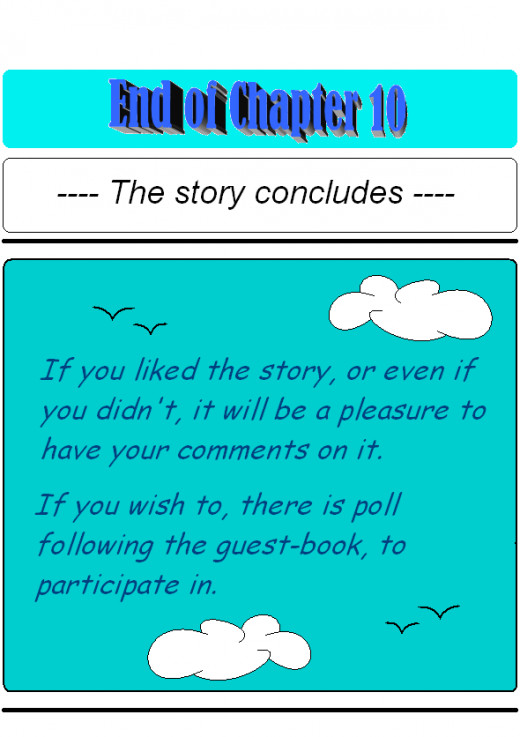
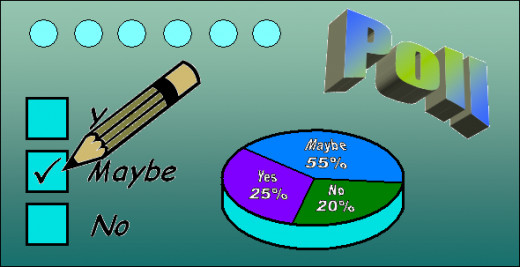
1. A question on story presentation
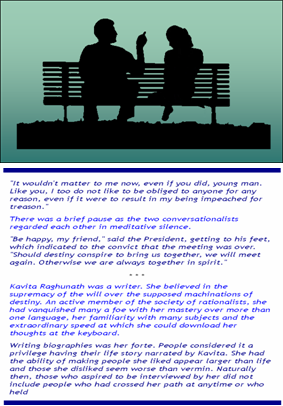
Did the inclusion of representative pictures -
2. Villains: vile, yet vital
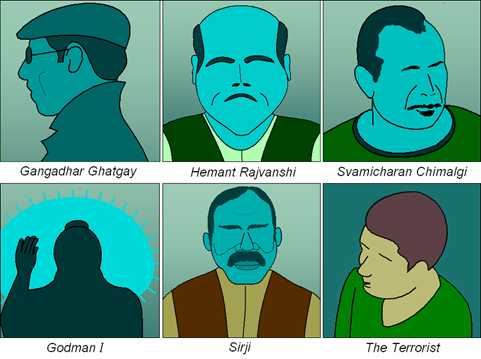
Which among the four would you consider the vilest of villains?
3. Ideas, Ideaologies, and Idealism
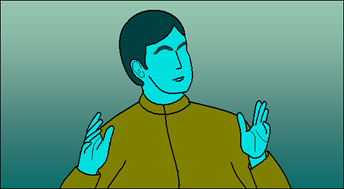
Do you agree with the ideology of Charuchandra Chimalgi?
4. A glimpse at the future
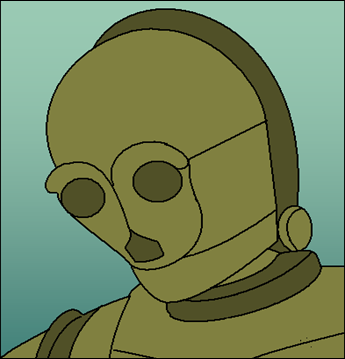
Would you feel comfortable having an android for a friend?
5. Matter and Spirit

